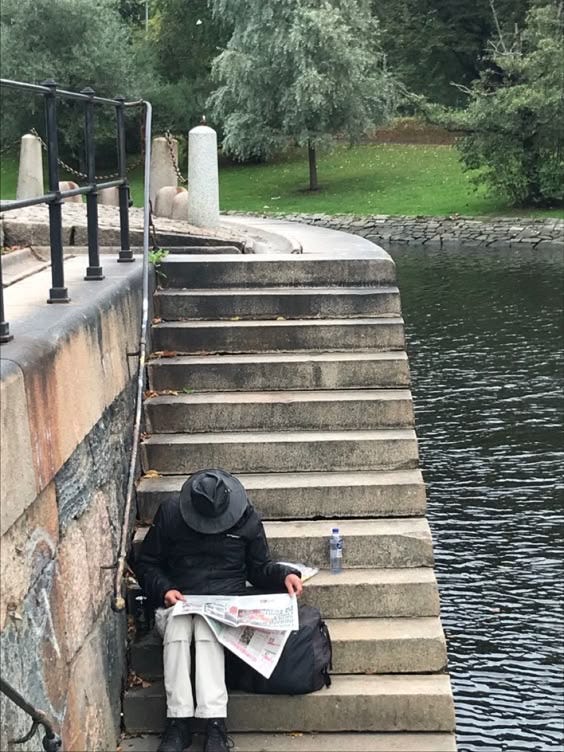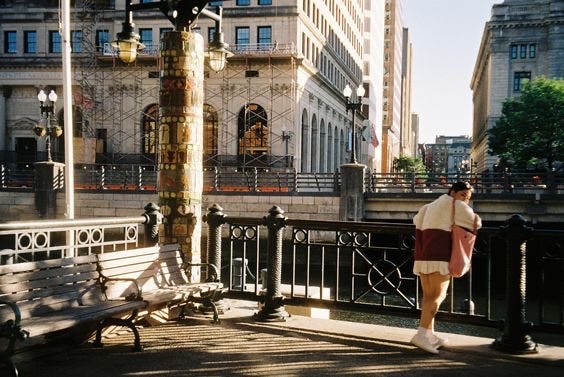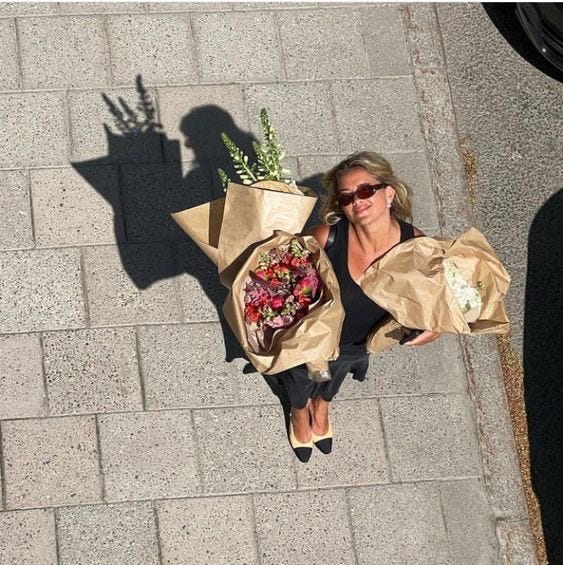there was a morning when i stared at my own reflection for so long that the face looking back stopped feeling like mine. it wasn’t because anything had changed — my hair was the same, my eyes were the same, my life was mostly the same — but i couldn’t shake the thought that i was still waiting to become someone else. the person i had been working toward for years, the one who would finally feel at ease in her own skin, the one who would wake up without the constant hum of self-criticism playing in the background. i kept thinking: when does she arrive? when do i get to be her?
that question stayed with me for years. because i tried everything i was told would help. the morning routines. the endless journaling. the habit trackers and the books that promised to “change my life” if i just followed the steps. and for a while, i convinced myself it was working. i posted the highlights. i checked the boxes. i wore the kind of confidence that photographs well but disappears the moment the camera goes away. but inside, it always came back to the same thing: no matter how hard i worked on myself, i never felt like i was enough.
the truth is, i don’t know when that belief began. maybe in classrooms where grades decided your worth in neat red numbers. maybe in conversations where compliments were given like currency and silence felt like debt. maybe in the glossy images of women on magazine covers who seemed to have all the things i thought i needed: beauty, ease, certainty. wherever it started, it stayed. it grew roots so deep that i didn’t question them. i just learned to build my life around the idea that i had to earn belonging, that being myself wasn’t sufficient without proof.
and the proof was never enough. because the culture we live in doesn’t let it be. every day, there’s a new reason to feel behind. the algorithm serves us faces and bodies and homes that look like perfection, curated so tightly you can’t see the seams. the wellness industry tells us happiness is one more product away. self-love becomes a performance, a brand, a word stamped on tote bags and printed across neon sweatshirts. and you start to wonder: am i doing this right? am i working hard enough to feel okay? am i the only one who still feels like this?
that question haunted me. because i believed that liking yourself was a goal — a finish line, something you could cross if you tried hard enough. so i tried harder. i tracked my progress like a project plan. i learned how to say the right things about self-care even when i didn’t believe them. i tried to trick myself into feeling whole by acting like someone who was. and the more i performed, the further away it felt. because the truth i couldn’t face then was this: you cannot bully yourself into self-love. you cannot shame yourself into acceptance. and yet, that’s what i was doing, quietly, every single day.
it didn’t fall apart all at once. there wasn’t a dramatic breakdown or a cinematic turning point. it was smaller than that — the kind of tired that doesn’t show on your face but settles in your bones. the realization that i had spent years sprinting toward an imagined version of myself and i was still standing in the same place. the exhaustion of never arriving. that’s when something in me gave up. not in a hopeless way, but in a surrender i didn’t know i needed.
the first shift was this: i stopped trying to fix myself. which sounds simple, but it felt radical. i let the lists go. i let the need to optimize every corner of my life soften. and when the panic of not improving crept in — because it always does — i told myself it was okay to do nothing for a while. i didn’t call it healing then. i just called it breathing. i needed to breathe without making it a productivity hack.
what happened next wasn’t linear. it wasn’t even pretty. because when you stop running, everything you’ve been running from catches up. the insecurities. the old narratives. the fear that if you stop trying, you’ll become unlovable. i had to face all of it without the armor of constant self-improvement. and i hated it at first. i wanted to pick up the armor again. but something in me knew that staying was the only way through.
so i stayed. i sat with the discomfort. i let myself feel the things i’d been numbing with busyness and discipline. and slowly, in ways i can’t map on a timeline, i began to see myself differently. i started noticing how harsh my inner voice had become — the one that measured everything in terms of enoughness. and instead of obeying it, i began to question it. whose voice was that, really? mine? or the sum of every standard i had ever absorbed from a culture that profits when women feel broken?
that question changed everything. because when you realize how much of your self-criticism isn’t really yours, it becomes harder to take it as truth. i started paying attention to the world around me — the ways it tells us to shrink, to optimize, to perform — and i felt something close to anger. and under the anger was relief. because if the problem wasn’t me, maybe the solution wasn’t to keep fixing myself. maybe the solution was to reclaim the parts of me i had abandoned in the name of being acceptable.
liking myself didn’t come in a rush of clarity. it came in fragments. in the way i let myself laugh without checking what i looked like. in the way i started saying no when i meant no, even if it disappointed someone. in the way i let my body rest without making it earn rest through exhaustion. these weren’t grand gestures. they were quiet acts of rebellion against the belief that i had to deserve my own care. and with every act, a little piece of trust returned.
because that’s what self-acceptance really is — not a feeling that arrives fully formed, but a relationship you rebuild over time. and like any relationship, it needs proof. not big declarations, but small consistencies. showing up for yourself in the moments no one sees. forgiving yourself when you fall back into old patterns instead of turning that into another reason to hate yourself. learning to sit in your own company without constantly needing to escape it.
there are still days when i slip. days when i catch myself scrolling and comparing, when i feel like i’m back at the start. but the difference now is that i know slipping isn’t the same as failing. it’s just part of being human. and maybe that’s the most important thing i’ve learned — that being human was never the problem. the problem was believing that i had to erase the messiness to be worthy of love, when in reality, the messiness is what makes the love real.
if you’re reading this and hoping for a formula, i don’t have one. all i can tell you is this: it didn’t happen when i tried harder. it happened when i stopped trying to win a game that was rigged from the start. it happened when i gave myself permission to exist without explanation. it happened in moments so ordinary i almost missed them — the first time i caught my own reflection and didn’t flinch, the first time i felt proud of myself for resting, the first time i stopped apologizing for taking up space.
i like myself now. not all the time, not in every way, but in enough ways that it feels like home. and maybe that’s all we can ask for — not perfection, not an unshakable confidence, but a sense of belonging to ourselves that doesn’t vanish when life gets messy. because life will get messy. and the work isn’t to avoid that. the work is to keep returning to yourself, over and over again, until the returning feels natural.
and if you’re in the thick of it right now — still waiting, still working, still wondering when you’ll finally arrive — i hope you know this: you don’t have to wait to like yourself until you’re “better.” you don’t have to earn it. you don’t have to turn your life into a project just to feel like a person. you can start where you are, with the pieces you have, with the tenderness you’ve been told to hide. you can start today, in a moment so small no one will notice but you. and that will be enough.










This was such a beautiful told piece, Ayushi. It hit a nerve - especially the parts about performing self-love and trying to optimise yourself into worth.
I wrote about something similar recently, from a different angle - about how healing so often gets sold to us as performance, and how exhausting it is to keep pretending wholeness.
So your words felt like a quiet not from across the room.
Thank you for sharing them. B.
This is me…